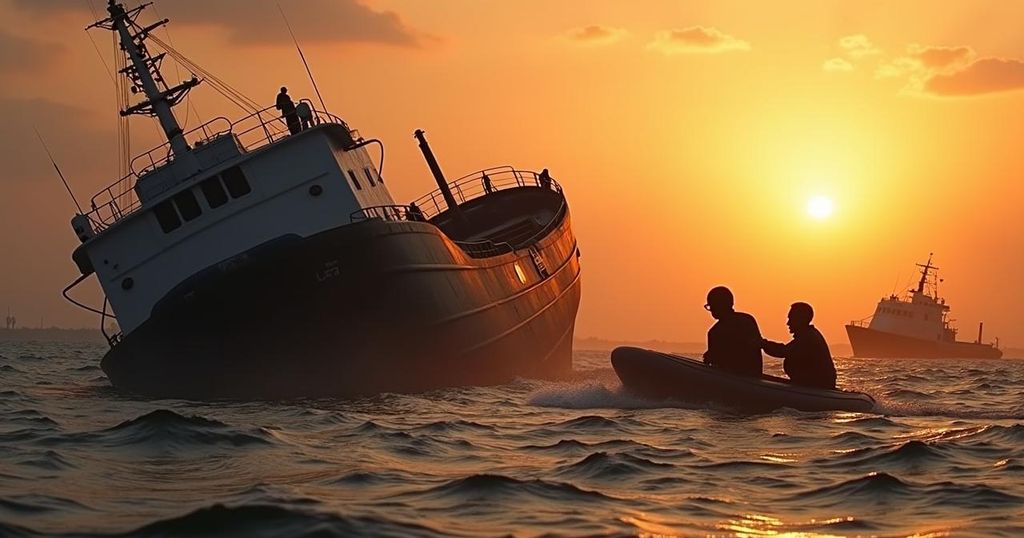Tragedy in Niger State: Boat Capsizing Claims Lives and Leaves Many Missing
Fourteen bodies have been recovered while around 150 passengers are missing following a boat capsizing in Niger State, Nigeria. The incident, attributed to overloading, raises concerns about safety regulations and governmental negligence in enforcing maritime laws. Local officials call for stronger measures to prevent similar accidents amid worsening climate challenges.
Tragedy struck in Nigeria’s central Niger State following the capsizing of a boat, which has resulted in the recovery of 14 bodies, with approximately 150 passengers still unaccounted for. The incident occurred late Tuesday as the overcrowded vessel, which was carrying around 300 individuals returning from a religious celebration in Gbajibo village, succumbed to disastrous conditions. Rescue efforts are currently underway along the River Niger, as officials strive to locate more survivors among the missing individuals. Zainab Sulaiman, the emergency coordinator for Niger State, indicated that local divers are actively engaged in the recovery efforts. She remarked on the issue of overloading: “The boat was overloaded, which is what has been happening. They overload the boats, and… most of these boats are old. So, with the weight of people, sometimes they even carry foodstuff in bags, you see that the boat capsizes or breaks into two.” Boat accidents are a frequent occurrence in Nigeria, often attributed to inadequate enforcement of safety regulations, including limitations on passenger capacity and the mandatory use of life jackets. There is also a tendency among local populations to disregard warnings against late-night aquatic travel. This most recent accident has spurred critical commentary regarding governmental oversight and negligence. A local official, who requested anonymity, disclosed, “As far as I’m concerned, there’s no one using life jackets in Niger State. You know, these are rural areas; they don’t even know what life jackets is all about.” The official emphasized a lack of awareness and exposure to safety measures among the affected communities, which further complicates prevention efforts. In response to the calamity, Sulaiman called for more stringent law enforcement regarding passenger safety aboard boats, stating, “The regulatory authorities should start to enforce these laws. If they need to send officers there at the boarding point, it will go a long way.” Compounding these issues are the effects of climate change, which has led to rising water levels due to unprecedented rainfall and flooding in Nigeria. The country’s hydrological agency recently issued warnings about increasing river levels and potential flooding risks following the water release from Cameroon’s Lagdo Dam. This incident follows a previous tragedy in which over 60 farmers perished in a boat capsizing in Zamfara State last month.
In Nigeria, boat accidents frequently occur due to a plethora of safety and regulatory issues. The lack of enforcement of load limits and the absence of safety gears such as life jackets contribute to the precarious conditions of local waterways. Cultural norms in many rural communities also lead to neglect of warnings against traveling by water at night, further exacerbating risks. Climate change has intensified weather patterns leading to increased rainfall and flooding, disrupting traditional lifestyles and safety practices. The latest incident illustrates the urgent need for stricter safety regulations and community education regarding life-saving measures in water travel.
The tragic capsizing of a boat in Niger State highlights the critical issue of safety in Nigeria’s water transportation system. With 14 confirmed fatalities and approximately 150 individuals missing, this incident underscores the dangers of overloading vessels and the negligence of safety regulations. The urgent calls for enhanced enforcement of maritime safety laws, alongside a need for community education on the importance of life jackets, are vital steps for preventing future tragedies. Furthermore, the ongoing challenges posed by climate change require proactive measures to mitigate risks associated with rising water levels and flooding.
Original Source: www.voanews.com




Post Comment